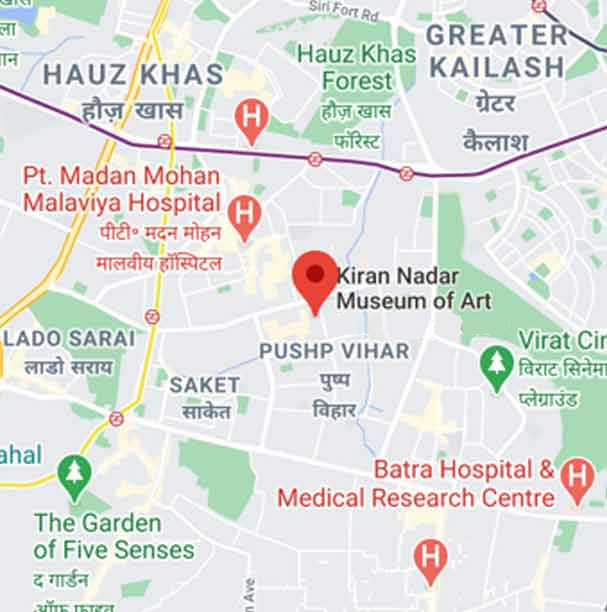- Home
- Home is a Space Left Behind
LECTURES / SYMPOSIUMS
Talks
Home is a Space Left Behind
Date :30 October 2025
Time :6:00 pm - 7:15 pm
Location : KNMA, Saket
31 October 2025

About the Event
Join us for a special evening dedicated to the stories and artists from the Caribbean and the Indian Ocean region and also artists from Bihar who create a visual language that points to multiple interpretations of identity and memory.
The panellists will engage on the theme of indentured labour, shifting identities in the cultures of the diaspora, and intertwining contemporary artworks, archives, oral histories and narratives of three generations. Curator Priya Swamy will share her research and work with archival images/objects in the collection of the Museum of World Cultures, Netherlands; artist Tamara Hartman dives into the personal archive of her Hindustani mother living in the Netherlands, while Prof. Brahma Prakash anchors discussions with his work on oral traditions and performances from the lens of Bidesia and indentured labour. Curator and artist Sarojini Lewis will share perspectives of women indentured labourers from Mauritius and Suriname from her recently published book, A Shift on Identity: Women Migrants.
This programme builds further on KNMA's research and interest in diaspora artists and the cultures of the diaspora. It follows the previous exhibition 'The Elemental You', curated by Akansha Rastog, which presented a substantial collection of works of three diaspora artists - Simryn Gill, Hajra Waheed and Neha Choksi. This panel discussion is co-organised with the Netherlands Embassy and is connected to the exhibition 'Home in A Space Left Behind' curated by Sarojini Lewis and Priya Swamy at the Bihar Museum.
BIOS
Prof. Brahma Prakash is an Indian cultural theorist, writer and academician who teaches theatre and performance studies at the School of Arts and Aesthetics, Jawaharlal Nehru University, New Delhi, India. He writes on art, culture and politics. He works on theatre and performance theories, rites, rituals and festivals, oral histories and narrative traditions, political performances, and cultural enactments. His writings are known for evoking powerful lyrical, poetic prose style essays drawing from multiples sources including personal
narratives, folk and literary and performance theories. Critics find his writings "lyrical and searing".
Sarojini Lewis (b. 1984, India/Sur/Netherlands) is a curator and researcher, with a background in Fine Art (MFA Fine Art Edinburgh University) and specialization in archival photography, video art and book arts. Her PhD in visual studies in JNU examined the indentured labour archive through a contemporary lens. Her projects reveal a preoccupation with history: of the landscape, the city, the environment and its user.
Sarojini has participated in several projects in 'Een Waakzame Blik', Rijksmuseum(2023), 'Onze Koloniale Erfenis' Tropenmuseum (2022) en Kruispunt in Wereldmuseum (2020) Research Fellow Aarhus University(2019), 'Traces', Goethe Institut (2018-2015) Social Science Institut GB Pant in Allahabad (2018), Kochi Biennale (2016) Casa Tres Patios (2014). Several international exhibition such as Solo Show in Gallery Onkaf New Delhi (2020) Museo Pivo & Escravidão e Liberdade in Brazil and Museum for Contemporary Art & Tent in Rotterdam(2018). Artwork is collected in several Book Art Collection; Tate Britain and British Library.
Priya Swamy is a Curator of Globalisation and South Asia at the National Museum of World Cultures, the Netherlands. Her research critically engages with the legacies and material culture of Indian indentured labour and South Asian diasporas, to understand belonging to multiple, creolized locations such as the Caribbean. Her current research grapples with questions of caste dominance in collection and exhibition practices, in order to think through the potential that political categories like Bahujan ('the many', 'majority'), have to repair and redefine the ways in which South Asia and its diasporas are articulated in museums. She holds a BA in World Religions from McGill University (Canada) and an MPhil and PhD in Area Studies from Leiden University.
Tamara Hartman, originally from the Netherlands, holds a BA in International Development from Wageningen University. After developing an interest in postcolonial and black feminist theory, Tamara chose to continue her studies at Utrecht University where she is currently obtaining an MA in Gender studies. For her internship and thesis she is researching the archive of Joan Ferrier, a pioneer in the Black Migrant Refugee Women's Movement in the Netherlands. Tamara enjoys writing articles as a freelance journalist in her search to understand her Hindu-Surinamese Dutch identity. Her plans for the future include enrolling in a second masters in colonial history, where she hopes to further research blind spots in our history books.
Akansha Rastogi is Associate Director, Visual Arts at the Kiran Nadar Museum of Art (KNMA) in New Delhi, India. Her research and writing focus on exhibition histories of modern and contemporary Indian art, institutional memory, artists' collectives, collectivity and how a collective body moves across periods, spaces and contexts. With an expanded curatorial practice where building frameworks meet policy and questions of agency, Akansha's exhibitions such as 'The Elemental You' (2024), 'Very Small Feelings' (2023), 'Hangar for the Passerby' (2017), 'Zones of Contact: Propositions on the Museum' (2013), 'Inhabiting the Museum' performance series (2011-15) and 'Archiving the Studio' (2011), have explored her
proposition of incrementalism, and specific kind of processing of the undigested materials, histories, and stories of intergenerational transferences vis-à-vis the idea of a South Asian art museum in South Asia.

